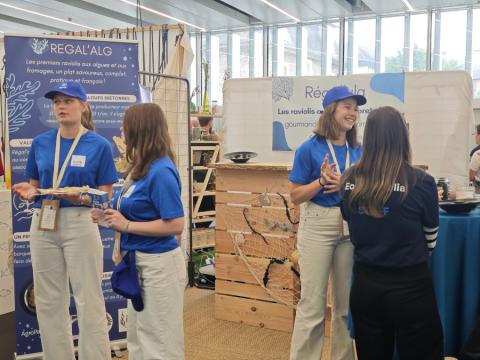
Perspectives: Gwenola Yannou-Le Bris and Célia Brunel on their Participation in the Ecotrophelia Competition with Régal’alg
June 27 2024Gwenola Yannou-Le Bris, Professor in Innovation Management, Eco-Design, and the Integration of Sustainable Development, and Célia Brunel, a 3rd-year engineering student at AgroParisTech specialized in Product Design and Development, talk about their participation in the Ecotrophelia competition with the Régal’alg project.
What did you take away from the competition?
Gwenola Yannou-Le Bris: This is a competition centered around innovation, which creates its own competitive universe, and which I found very enriching. It was interesting to see the changes brought about by innovative food products and to get feedback from professionals on the innovations being proposed. It was also a very enriching experience on a human level, with a real learning component to it.
This competition has become something of a gold standard thanks to widespread recognition in the agrifood sector. Not to mention the fact that it offers an opportunity to discuss with participants from other schools. Students learn a lot from it and it helps them refine their career goals.
Célia Brunel: I enjoyed being able to steer a project from A to Z, starting from scratch with an innovative idea and working as a team to take into account constraints like time, technical feasibility, and cost.
Coordination was crucial. We had to work together to ensure the project was a success and manage it in a way that took human factors and human perspectives into account. With a nine-member team, we had no option but to work together, as each person’s work had an impact on that of everyone else. It also taught me that project and team management work were something I enjoy.
What did you learn from the development of the Régal’alg project that you submitted for competition?
Gwenola Yannou-Le Bris: First, submitting this project for competition made it possible to test it in the real world, to confront it with the complexities involved in undertaking a food project that aims to support agroecological transitions. But taking part in the competition also offered an opportunity to gain clear insight into the acceptability of innovations and products.
Célia Brunel: I found it very rewarding and instructive to take part in actually developing an environmentally conscious and sustainable product that helps tackle public health problems (from the need to eat more fiber to combating growing levels of iodine deficiency) and doesn’t use fossil energy in its development.
What’s more, it was also my final-year project, and it was important for me to test it out in the real world.
Down the line, I would like to make my future projects meaningful by centering them around these crucial social and environmental issues.

